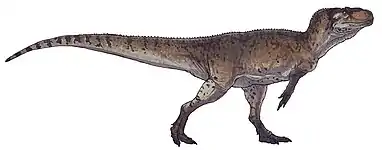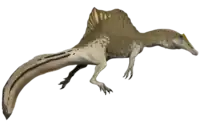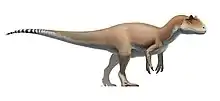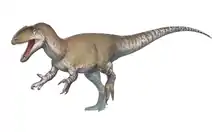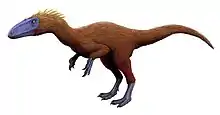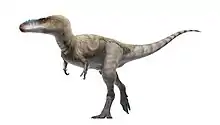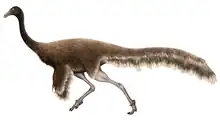| Camarillasaurus Temporal range: Early Cretaceous, | |
|---|---|
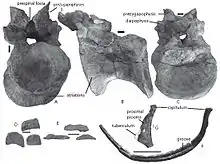 | |
| Vertebra and rib fossils | |
| Scientific classification | |
| Domain: | Eukaryota |
| Kingdom: | Animalia |
| Phylum: | Chordata |
| Clade: | Dinosauria |
| Clade: | Saurischia |
| Clade: | Theropoda |
| Family: | †Spinosauridae |
| Subfamily: | †Spinosaurinae (?) |
| Genus: | †Camarillasaurus Sánchez-Hernández & Benton, 2014 |
| Type species | |
| †Camarillasaurus cirugedae Sánchez-Hernández & Benton, 2014 | |
Camarillasaurus (meaning "Camarillas lizard") is a genus of spinosaurid dinosaur from the Early Cretaceous period (Barremian) of Camarillas, Teruel Province, in what is now northeastern Spain. Described in 2014, it was originally identified as a ceratosaurian theropod, before being referred to the Spinosauridae in 2021.
History of research
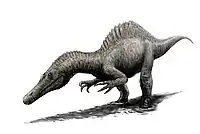
Fossils of Camarillasaurus were discovered in the Camarillas Formation. The type species, Camarillasaurus cirugedae, was described by palaeontologists Bárbara Sánchez-Hernández and Michael J. Benton. The describers considered it to be a basal ceratosaur, somewhat unusual given its young age.[1] However, in an abstract given at the EAVP 2019 conference, Oliver Rauhut and colleagues suggested it is a member of the Spinosauridae rather than a ceratosaur, based on characters of the posterior caudal vertebrae and newly excavated material at the type locality;[2] a chapter of a 2019 dissertation by Adun Samathi concurred with that conclusion.[3] In 2021, the chapter was formally published as a paper, with the same conclusion; Samathi noted similarities with spinosaur material from Thailand and other taxa within the family. Camarillasaurus is one of 4 spinosaurid taxa known from the Iberian peninsula, the others being Vallibonavenatrix, Protathlitis and Iberospinus.[4][5]
Classification
In the 2023 description of Protathlitis, Santos-Cubedo et al. performed a phylogenetic analysis, recovering Camarillasaurus as the basalmost member of the Spinosauridae, outside of the Baryonychinae/Spinosaurinae split. They further suggested that, due to similarities in anatomy, phylogenetic position, and age, Iberospinus may be the sister taxon to Camarillasaurus, or synonymous with it. Their results are shown in the cladogram below:[6]
| Spinosauridae |
| ||||||||||||||||||||||||||||||||||||||||||||||||
References
- ↑ Sánchez-Hernández, B. R.; Benton, M. (2014). "Filling the ceratosaur gap: A new ceratosaurian theropod from the Early Cretaceous of Spain". Acta Palaeontologica Polonica. 59 (3): 581–600. doi:10.4202/app.2011.0144.
- ↑ O. W. M. Rauhut, J. Ignacio Canudo, D. Castanera A (2019) A REAPPRAISAL OF THE EARLY CRETACEOUS THEROPOD DINOSAUR CAMARILLASAURUS FROM SPAIN XVII Conference of the EAVP – Brussels, Belgium
- ↑ Adun Samathi (2019) CHAPTER 6: "A Spinosaurid from Thailand and the Reassessment of Camarillasaurus from the Early Cretaceous of Spain" in THEROPOD DINOSAURS FROM THAILAND AND SOUTHEAST ASIA PHYLOGENY, EVOLUTION, AND PALEOBIOGEOGRAPHY Dissertation Thesis, University of Bonn pp.161-181
- ↑ Samathi, Adun; Sander, P. Martin; Chanthasit, Phornphen (2021-02-08). "A spinosaurid from Thailand (Sao Khua Formation, Early Cretaceous) and a reassessment of Camarillasaurus cirugedae from the Early Cretaceous of Spain". Historical Biology: 1–15. doi:10.1080/08912963.2021.1874372. ISSN 0891-2963. S2CID 233884025.
- ↑ Mateus O, Estraviz-López D (2022). "A new theropod dinosaur from the Early Cretaceous (Barremian) of Cabo Espichel, Portugal: Implications for spinosaurid evolution". PLOS ONE. 17 (2): e0262614. doi:10.1371/journal.pone.0262614. hdl:10362/142749.
- ↑ Santos-Cubedo, A.; de Santisteban, C.; Poza, B.; Meseguer, S. (2023). "A new spinosaurid dinosaur species from the Early Cretaceous of Cinctorres (Spain)". Scientific Reports. 13 (1). 6471. doi:10.1038/s41598-023-33418-2. hdl:10234/203142.
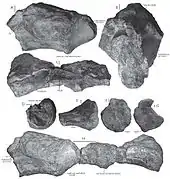
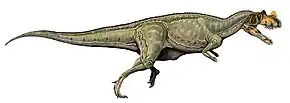
.jpg.webp)

